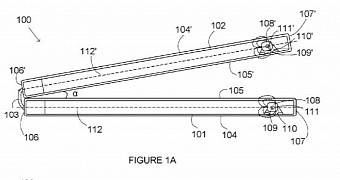We’ve known for a while that Microsoft at least explored ways to build a device with foldable screens (referred to by many as Surface Phone, but more likely to be called Andromeda), and a recently-discovered patent provides us with a closer look at one of its key features.
Of course, patents are by no means confirmation of a new feature or device, but since Microsoft filed for this technology in 2016, there’s a good chance the project is in a more advanced stage right now.
Spotted by Neowin, the patent is called “magnetic block locking of an electronic device” and describes a new technology that could be used on devices with foldable screens to keep them closed.
Previous speculation indicated that the Surface Phone, or whatever it’ll be called, could come with foldable screens and a new hinge allowing for several form factors. When the two screens are closed, similar to a closed book, this magnetic locking system could help keep the device from opening, as it’s mentioned in the patent.
Launching later this year?
The abstract section of the patent provides more information over how the whole mechanism could work, though it’s worth knowing that if it ever reaches production, it could receive several other tweaks not mentioned here:
“An electronic device or electronic device assembly may comprise a first portion and a second portion, a first magnet disposed inside the first portion and rotatable about a pivot axis with respect to the first portion, and a second magnet disposed inside the second portion and rotatable about a pivot axis with respect to the second portion. The first and second magnet may be configured to rotate so that the first and second magnets magnetically engage each other when the distance between the first and second magnet is equal to or smaller than a first distance.”
According to unconfirmed rumors, a new mobile device from Microsoft could land as soon as this year with Windows Polaris, a Microsoft Store-restricted OS version that allows Win32 software with virtualization.

 14 DAY TRIAL //
14 DAY TRIAL //